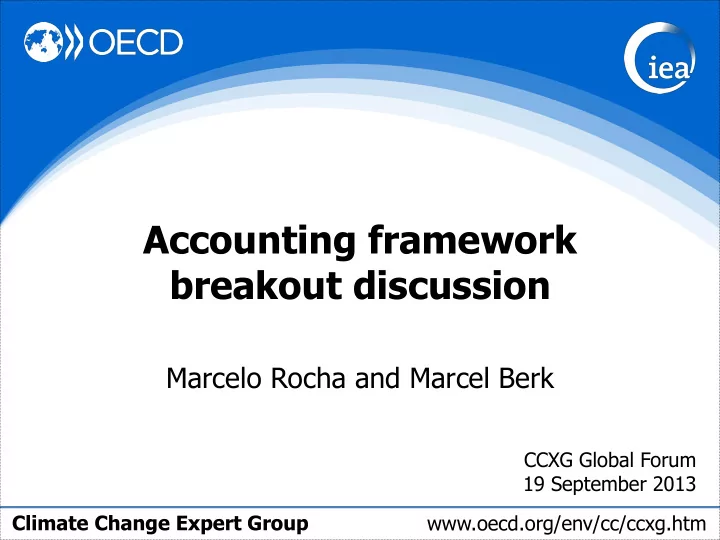

Accounting framework breakout discussion Marcelo Rocha and Marcel Berk CCXG Global Forum 19 September 2013 Climate Change Expert Group www.oecd.org/env/cc/ccxg.htm
Two part discussion 1. General issues and elements of an accounting framework for the 2015 agreement 2. Specific accounting issues surrounding transfer of market-based units Climate Change Expert Group 2
Elements of an accounting framework: Questions for discussion What are the implications of different types of commitments for the accounting framework under the 2015 agreement? What elements of KP accounting and UNFCCC reporting can inform an accounting framework under the 2015 agreement? What is needed in addition to Common Tabular Format tables to better understand progress towards commitments? Climate Change Expert Group 3
1. What are the implications of different types of commitments for the accounting framework under the 2015 agreement? Many and varied implications for nature of accounting, depending on type of commitments. Seeking a framework that is clear, with simple provisions usable by all Parties. Requirements could be scaled up progressively with capabilities, bounded by key elements (IPCC guidelines etc …) in a tiered approach. Different information/rules may be need to understand commitments ex- ante, rather than just add up results ex-post. Is bounded flexibility for accounting similar to that for commitments? Principle could be similar, but implementation different. Links between accounting and ambition of pledges: technically, accounting does not guarantee ambition but could help with political will. Climate Change Expert Group 4
2. What elements of KP accounting and the UNFCCC reporting can inform an accounting framework under the 2015 agreement? We have two decades of experience under UNFCCC and KP: IPCC methodologies, coverage, GWPs, inventories, national communications. Some parties have more experience than others. There is current flexibility in KP framework: tiers, country-specific emissions factors, key category analysis, exclusion of immaterial emissions, base years, LULUCF, annual vs CP accounting for LULUCF. Also already flexibility in inventory – scale up with capacity. Rules have evolved: e.g. LULUCF allowed pick/choose in CP1, now have to account for forest management, with bounded flexibility in reference levels. There are checks and balances with expert review team recommendations. Climate Change Expert Group 5
Transfers of market units: Questions for discussion What are the implications of different types of commitments for the transfer of units e.g. with national commitments defined as single-year targets as opposed to multiple-year targets? What do we need to know about post-2020 commitments to avoid or minimise “double claiming” of market units as counting towards the pledge of more than one country? What do we need to know about domestic market mechanisms if their units may be counted towards national commitments under UNFCCC? Climate Change Expert Group 6
Climate Change Expert Group 7
Transfers of market-based units Double counting: arises from different ways of accounting for different commitments; can be perceived as undermining effectiveness of pledges and/or the agreement Single- versus multi- year target periods: this is a wider comparison issue that becomes more difficult in the context of market mechanisms – continuous vs discontinuous accounting Market mechanisms to date have operated in multi- year periods. With single-year targets, need to think carefully about both seller and buyer of units Technical options presented for using units with single- year targets but political feasibility was questioned Climate Change Expert Group 8
Transfers of market-based units (2) Access to use of market units linked to broader incentives for participation in new agreement. Technical options exist for what is needed for national unit transfer systems to be robust, but trade-off with incentives for why countries would want to be involved Further work ideas on implications of use of units within different commitment types and periods Creation of units and ensuring quality of emission reduction units is also important but separate to today’s discussion on accounting Climate Change Expert Group 9
Recommend
More recommend